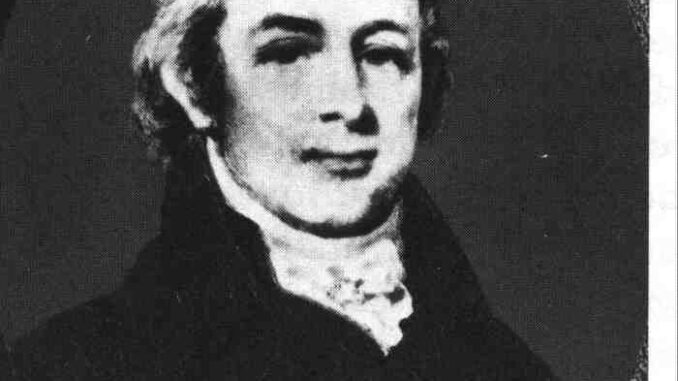
An Antifederalist’s Closing Argument.
When the McCulloch v. Maryland case landed in the US Supreme Court in a power play between the states and the federal government, an old spokesman for states’ rights made his final argument against centralized power and the loose interpretation of the Constitution he had long feared. Antifederalist Luther Martin had fought this fight since 1787. As a Maryland delegate to the Philadelphia convention he opposed many ideas in the drafted Constitution. By 1819, however, Martin and his cause were old, unstable, and unlikely to prevail.
Luther Martin became a chief critic in the new design of government. With a rough voice and an affinity for the bottle, Martin dressed carelessly and proved an impulsive, undisciplined wild man. His long-winded speeches annoyed other delegates. He even opposed the Great Compromise that created the House and Senate and allowed the convention to continue. Disgusted and needing to return home to Maryland, he departed thirteen days before the final draft was signed. He wanted to return, primarily to vote against it. “I wished…to have been present at the conclusion, to have given [it] my solemn negative,” Luther lamented. “It is my highest ambition that my name may also be recorded as one who considered the system injurious to my country.”
He continued to oppose the Constitution, denouncing it before the Maryland House of Delegates and in several newspaper essays. When it came time for Maryland to ratify, Martin assured his attendance at the state’s ratifying convention, one of only about a dozen Antifederalists there. These men warned the proposed form of government “defective and that the liberty and happiness of the people will be endangered.”
After ratification Martin begrudgingly accepted the new government and spent most of his public career as Maryland’s attorney general. In the early 1800s, Martin gained fame by defending two political friends in high profile cases. In one of the first federal impeachments, he successfully defended Supreme Court Justice Samuel Chase on the floor of the Senate in 1805. Two years later he defended former Vice President Aaron Burr against conspiracy and treason charges.
After a career as state attorney general and later a judge, Maryland called on him to defend the state’s rights in the US bank case, McCulloch v. Maryland. Martin wasn’t at the top of his game and faced insurmountable odds. He had earned a reputation as “Lawyer Brandy Bottle.” In an earlier Supreme Court appearance he was so drunk the court adjourned rather than let him try and conduct his case. The national government he opposed a generation before had grown in strength and support, and Federalists dominated the Supreme Court.
In McCulloch Maryland opposed and taxed the US Bank. At court, Martin referred to a recorded debate from the founding to show how the Constitution “contained a vast variety of powers, lurking under its general phraseology, which would prove highly dangerous to the liberties of the people and the rights of the states.” He was speaking to the vague nature of the necessary and proper clause and early fears that potential interpretation that would excessively place the federal government over the states. He reminded the Court how the Tenth Amendment was added to assure states’ reserved powers. “We are now called upon to apply that theory of interpretation which was then rejected by the friends of the new Constitution, and we are asked to engraft upon it powers of vast extent…which, if they had been fairly avowed at the time, would have prevented its adoption.”
Martin, Maryland, and other living Antifederalists lost. The Court sided with the federal government, supremacy, and expanded congressional powers. A year later he suffered a severe stroke. His age and lifestyle made him infirm and insolvent. Though a three-time loser in his quest for states’ rights, friends came to assist Martin in his final time of need. The state legislature passed a unique law that required all licensed attorneys to contribute five dollars annually into a fund to assist him. And, the man he defended from treason charges, Aaron Burr, took Martin into his New York home for the final three years. He died in 1826.